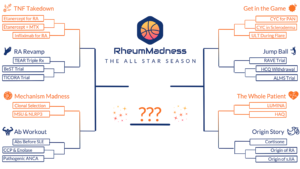RheumMadness is back for its third season, and everyone who is crazy about rheumatology is welcome to play. That includes practicing rheumatologists, fellows, residents, medical students, advanced practice providers, other healthcare professionals and patients. Basically, if you are reading this article, you can play RheumMadness.
RheumMadness is an online tournament in which a bracket of teams, representing key learning concepts in rheumatology, compete against each other in a series of head-to-head match-ups, much like basketball teams in the NCAA (National Collegiate Athletic Association) March Madness tournament. Participants learn about these concept teams by reviewing scouting reports (i.e., topic summaries—created by dozens of rheumatology fellows and practicing rheumatologists).
After learning about the concept teams, participants fill out their own brackets, attempting to predict the teams that will win each match-up. Playing RheumMadness is easy and free.
The true winners of each match-up are selected by consensus of a blue ribbon panel of judges based on its perception of which teams represent the most important, impactful and exciting concepts in the tournament. Participants get points when their picks match those of the blue ribbon panel, and the participants with the most correct predictions will be crowned the winners of RheumMadness.
If that sounds confusing, don’t worry—we provide ample instructions along the way.
RheumMadness is supported by a Clinician Scholar Educator Award from the Rheumatology Research Foundation (Dr. Leverenz is principal investigator) and modeled after the NephMadness tournament in nephrology. To learn more, head to the RheumMadness website.
The All-Star Season
The theme of RheumMadness 2023 is the All-Star Season. Each of the 22 teams in the tournament is based on one all-star article competing to be named the most important and transformational article ever written in the field of rheumatology (see Figure 1). The teams represent a diverse array of manuscripts, from the earliest descriptions of rheumatic diseases to theories of basic immunologic mechanisms and some pivotal trials that fundamentally shifted treatment outcomes in rheumatology.
Fellows and attendings from 19 fellowship programs and two private practice groups chose these teams and created scouting reports to teach participants why they think each team has a chance to win it all. By engaging in this tournament, participants will have a chance to explore how the field of rheumatology developed into what it is today, gaining a deeper understanding of what it means to be a rheumatologist. Participants are challenged to press onward to even more transformational discoveries in the future.
How to Play
We have made it easy for everyone to play RheumMadness. On Wednesday, Feb. 22, we will release all the scouting reports on the RheumMadness website, and the tournament will open for participants to submit their brackets. Participants will have four weeks to learn about the teams in the tournament and submit their picks. Bracket submissions will remain open through Wednesday, March 22. Submitting a bracket is free and easy; the process only takes a few minutes.
The results of the tournament will be released in five rounds, beginning Thursday, March 23, and continuing through Monday, April 3, at which time we will name the winners of RheumMadness 2023.
Connect with RheumMadness
Stay connected with RheumMadness to enjoy the learning and fun. Participants can sign up for our newsletter on our website, subscribe to the RheumMadness podcast (available on all major podcast applications) and join the conversation about RheumMadness on Twitter using the hashtag #RheumMadness.
We encourage fellowship programs and group practices to use RheumMadness material for their didactics and fill out their brackets together.
However you decide to engage with RheumMadness, we are sure you will have a fun and educational experience.
David L. Leverenz, MD, MEd, is an assistant professor of medicine in the Division of Rheumatology and Immunology, Duke University School of Medicine, Durham, N.C.
Acknowledgments
The author thanks the following individuals for their contributions to this article and support for RheumMadness 2023: Courtney Bair, medical student, Duke University School of Medicine, Durham, N.C.; Meridith Balbach, medical student, Vanderbilt University School of Medicine, Nashville, Tenn.; Akrithi U. Garren, MD, assistant professor of medicine, Division of Rheumatology, MedStar Washington Hospital Center, Washington, D.C.; Lauren He, MD, chief internal medicine resident, University of Chicago; Guy Katz, MD, adult rheumatology fellow, Division of Rheumatology, Allergy & Immunology, Massachusetts General Hospital, Boston; Ben Kellogg, MD, internal medicine resident, Duke University Hospital; Benjamin D. Lueck, medical student, Duke University School of Medicine; Michael Macklin, MD, rheumatology fellow, Section of Rheumatology, University of Chicago; Iman Qaiser, MD, rheumatology fellow, Division of Rheumatology, Louisiana State University, Shreveport; Sabahat Usmani, MD, internal medicine resident, Weiss Memorial Hospital, Chicago; Matthew A. Sparks, MD, associate professor of medicine, Division of Nephrology, Duke University School of Medicine, and staff physician, Durham Veterans Affairs Health Care System, North Carolina; and Lisa G. Criscione-Schreiber MD, MEd, professor of medicine, Division of Rheumatology and Immunology, Duke University School of Medicine, and staff physician, Durham Veterans Affairs Health Care System.
Disclosures
Dr. Leverenz receives funding for RheumMadness from the Rheumatology Research Foundation Clinician Scholar Educator Award. He has also received grant funding from Pfizer for quality improvement and education work unrelated to RheumMadness.




